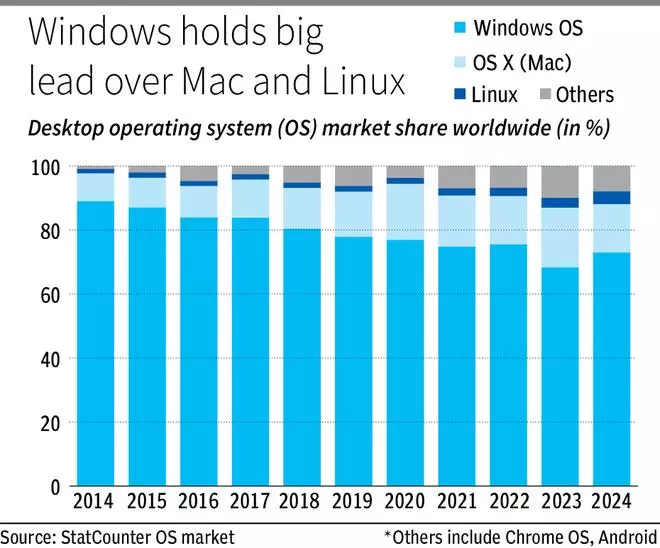As Windows machines worldwide experienced an outage due to a faulty update from cyber security provider CrowdStrike, the focus is on Microsoft’s dominance of the operating system (OS) ecosystem.
Windows OS holds an overwhelming 73 per cent market share worldwide as of 2024, according to data from the global market share tracker StatsCounter. OS X (also called Mac OS), developed by Apple, holds the second spot at just 15 per cent share. Linux, the OS preferred by most open source enthusiasts and developers, just holds around 4 per cent share
Even as Microsoft dominates the desktop OS market, Apple’s Mac OS and Linux have been eating into its share over the years. In 2014, Windows OS held an 89 per cent share, Mac OS 8.7 per cent, and Linux just 1.3 per cent.

Operating systems are the underlying platforms that connect computer hardware and software and as a result, companies that develop OS are considered to have a strong influence on the lives of internet users globally.
- Read: Microsoft outage causes 56 flight cancellations from India, 1,390 globally amid IT disruptions
Even though Microsoft Windows is a leader in desktop operating systems, its mobile device operating system has failed to find the top spot in the smartphone world, where Android and iOS hold 71 per cent and 28 per cent share, respectively, as of July 2024.
Microsoft’s dominance in the OS space can be attributed to its strategic early moves to secure its position.
“Windows capitalized on the OS market with a user-friendly GUI [graphical user interface] while still offering hardware compatibility unlike Apple’s closed ecosystem. Also traditionally, Windows PCs were cheaper than Macs, making them more accessible for homes and businesses on a budget,” Santosh Kumar Jha, Co-founder and CTO, Zeron, said. “I believe in the power of the Open Source Community and I think that Linux-based OS will be growing in market share in the coming years,” he added.
The worldwide impact of the outage also throws light on dependence on Big Tech, such as Microsoft, in running daily lives and businesses. Analysts note that the current outage also highlights diversity in the use of critical IT infrastructure, such as operating systems, cybersecurity products, and other applications.
“Where diversity is low, a single technical incident, not to mention a security issue, can lead to global-scale outages with subsequent knock-on effects,” Jake Moore, Global Security Advisor at cybersecurity firm ESET, said.
This is a key reason why tech companies such as Zoho Corp are said to be working on an Indian OS alternative for laptops to keep critical IT systems within the country. Zoho founder Sridhar Vembu said last year that the company is working on its own operating system for laptops based on Linux.





Comments
Comments have to be in English, and in full sentences. They cannot be abusive or personal. Please abide by our community guidelines for posting your comments.
We have migrated to a new commenting platform. If you are already a registered user of TheHindu Businessline and logged in, you may continue to engage with our articles. If you do not have an account please register and login to post comments. Users can access their older comments by logging into their accounts on Vuukle.